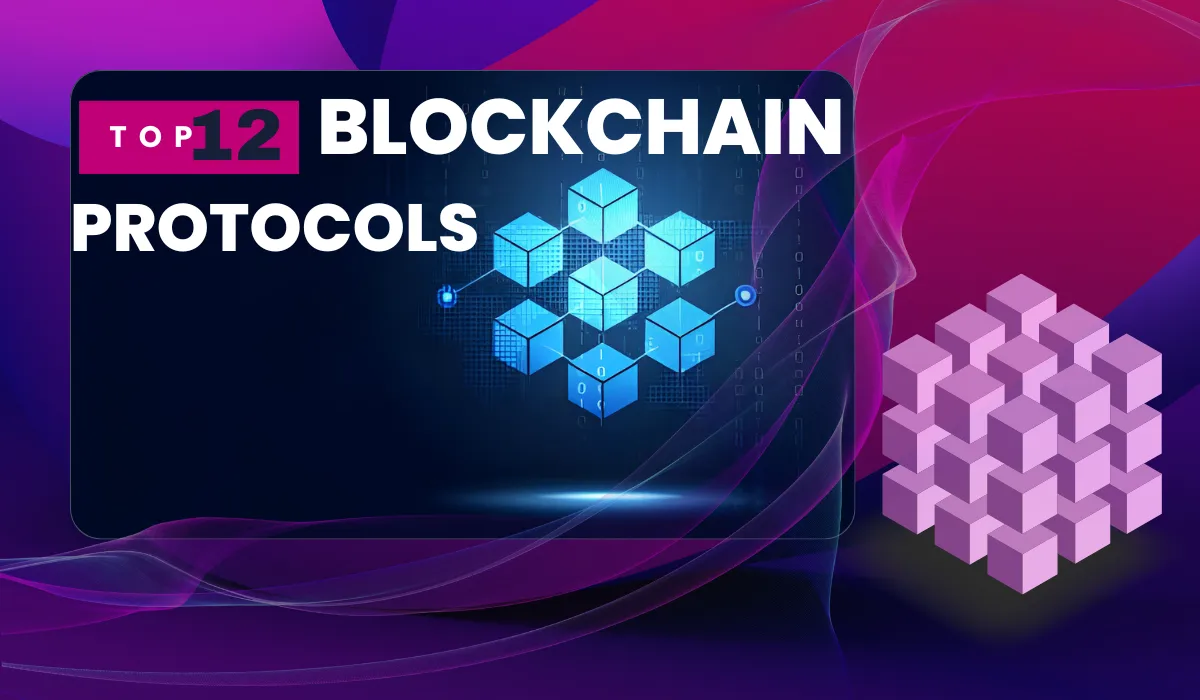Blockchain protocols are an important term that every crypto investor should be familiar with. If you want to learn more about blockchain protocols and the top 12 blockchain protocols in the market, please keep reading this article.
Blockchain protocols are rules or guidelines that dictate the safe and secure transfer of data across blockchain networks. Protocols function irrespective of the various software used in computers.
Blockchain is decentralized and distributed and the information is made available across the network. Since there is no centralized authority to monitor the daily activities of blockchain networks, these protocols govern the functioning of the network and address any security issues, decentralization, scalability, and consistency.
How do Blockchain Protocols Function?
Blockchain protocols govern the information exchange at every stage. The working of the blockchain protocol is mentioned below.
- Blockchain protocol starts functioning when someone requests a transaction. After the request is accepted by the protocol, the information about this transaction is passed to all nodes.
- A new block is created under the supervision of the protocol and is distributed among all the nodes. The nodes verify the transaction.
- The blockchain protocol sends rewards to each node for verifying the transaction. The new block created is accepted into the network and cannot be further modified.
- The new changes made are updated on the database by the protocol and the transaction is successfully ended.
The blockchain protocol is involved in each and every stage of the transaction.
Top 12 Blockchain Protocols
Now that you know about blockchain protocols and their importance in ensuring secure transactions, let us take a look into the 12 main blockchain protocols that exist today.

1. Ethereum
Ethereum is a decentralized open-source blockchain protocol that allows its users to conduct transactions without the interference of an authority.
Other than payments and digital transactions, Ethereum is also a platform for building apps and games.
Ether(ETH) is the native cryptocurrency of Ethereum. With Ethereum, you will have a tamper-proof, immutable, and highly scalable protocol to safeguard your crypto transactions.
2. Polkadot
Polkadot is another popular blockchain protocol. Polkadot promotes cross-chain interactions. It can work across multiple platforms and gather information from different private chains to develop public chains.
Polkadot employs a unique security model of pooling security. That means Plokadot’s security is applicable across all the chains that it interacts with.
The on-chain governance and developmental activities of Polkadot are quite transparent and verifiable by all.
3. Hedera Hashgraph
Hedera Hashgraph works on the hashgraph consensus which ensures that it is immutable and transparent.
Hedera uses its unique gossip protocol and virtual voting to scale up about 10,000 transactions per second.
This protocol is suitable for every investor due to its low transaction fee structure and lack of latency.
Hedera offers fair, secure, and transparent transactions at a very fast pace.
4. Stellar
Stellar is a platform that allows the trading of digital representations of fiat currencies as well as cryptocurrencies. It is a publicly owned and operated decentralized, open-source network.
Stellar is highly scalable and shows high-quality performance. The nodes give consensus for transactions in a matter of seconds, making it fast.
The platform allows transactions in multiple currencies facilitated by its native cryptocurrency Lumen.
5. Tron
Tron is yet another blockchain protocol that allows high security, scalability, and a high throughput rate. The platform operates on a three-layer architecture: ‘Storage layer’, ‘Application layer’, and ‘Core layer’.
This lightweight architecture along with low transaction fees and EMV-compatibility makes it a suitable choice for crypto investors.
6. Binance Smart Chain (BMC)
BMc blockchain operates on a proof of stake consensus with smart contracts and EVM compatibility. It is inherently interoperable. The chain is supported by a community that allows governance and staking.
7. Cardano
Cardano is a decentralized platform that provides security and sustainability to dApps. This third-generation platform is known for its scalability efforts, sustainability, and interoperability as it works on the proof of stake consensus mechanism.
8. Solana
Solana is a globally adopted censorship-resistant protocol that allows fast and secure transactions. Solana uses Verifiable delay functions and Proof of history consensus to aid its productivity. It is low-cost, composable, and scalable.
9. Polygon
Polygon connects the various blockchains that are compatible with Ethereum. This protocol benefits from the advantages of Ethereum.
It addresses the problems of high gas fees and low transaction rates while making transactions secure and scalable.
10. Tezos
Tezos is an ever-evolving protocol that works through self-amendment. It has native smart contracts written in its own programming language, Michelson.
Tezos uses a delegated proof of stake consensus algorithm where every token holder can participate as a delegate irrespective of their status.
11. Hyperledger Fabric
Hyperledger works as an open-source protocol that only allows authorized entities to participate in its activities. Hyperledger upholds the privacy of the transactors by sharing data only on a need-to-know basis.
It is supported by various cloud computing facilities such as Amazon Web Services, Google, IBM, Microsoft Azure, etc.
12. Avalanche
Avalanche is a high-speed blockchain technology provider that scales its transactions using a time-to-finality function. Avalanche (AVAX) is the native cryptocurrency of Avalanche. As it is an open-source decentralized protocol it is highly scalable with a high throughput rate. It is known to create application-specific blockchains that are interoperable.
Bottom Line
It is important to consider the pros and cons of each blockchain protocol and its suitability to your specific use cases before investing in them.
